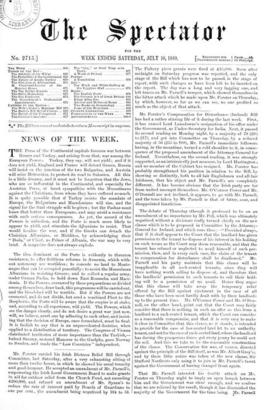The debate of Thursday (though it professed to be on
an amendment of no importance by Mr. Pell, which was ultimately negatived without a division) really turned chiefly on the new clause which is to be proposed in Committee by the Attorney- General for Ireland, and which runs thus :—"Provided always, that if it shall appear to the Court that the landlord has given permission to the tenant to dispose of his interest in his holding on such terms as the Court may deem reasonable, and that the tenant has refused or neglected to avail himself of such per- mission, then, and in every such case, the claim of the tenant to compensation for disturbance shall be disallowed." Mr. Parnell and his party maintain that this clause will be inapplicable to all rack-rented tenants, since they will have nothing worth selling to dispose of, and therefore that the landlords' permission to such tenants to sell their hold- ing will be a permission of no avail. Hence they argue that this clause will take away the temporary relief offered by the Bill against ejectinent in the case of all those who have been most hardly dealt with by their landlords up to the present time. Mr. O'Connor Power and Mr. O'Don- nell, on the other hand, point out that the Court may fairly consider that there is nothing in such an offer as this from a landlord to a rack-rente.1 tenant, which the Court can consider as a reasonable compromise, and that it is very easy to make it clear in Committee that this clause, as it stands, is intended to provide for the case of low-rented land let to an unthrifty tenant, and not for the case of rack-rented land, where the landlord has during the prosperous times got every penny he could out the soil. And this we take to be the reasonable construction of the clause. The Conservative fire was, of course, directed against the principle of the Bill itself, as was Mr. Albert Grey's; and by them little notice was taken of the new clause, Sir Stafford Northcote only using it to join in Mr. Parnell's taunt against the Government of having changed front again.


































